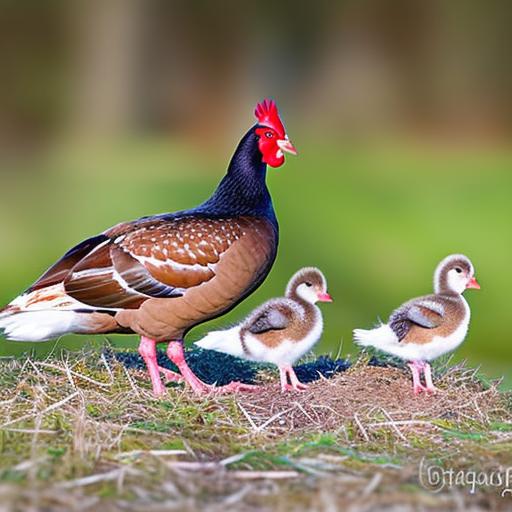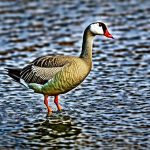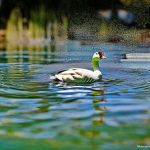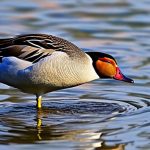Keeping hens and geese together can be a rewarding and beneficial experience for poultry enthusiasts. While there are some challenges to consider, the benefits of mixed flocks can outweigh the difficulties. Personally, I have had great success in keeping hens and geese together on my farm. In this article, I will discuss the benefits of cohabitating these two species, how to choose compatible breeds, providing adequate space, feeding and watering requirements, creating a safe environment, managing egg production, addressing potential health issues, and training hens and geese to coexist peacefully.
Key Takeaways
- Keeping hens and geese together can provide numerous benefits, including pest control and increased egg production.
- Choosing the right breeds is crucial for successful cohabitation, as some breeds may be more aggressive towards each other.
- Providing adequate space is important to prevent overcrowding and aggression between birds.
- Feeding and watering requirements should be carefully monitored to ensure all birds have access to enough resources.
- Creating a safe and secure environment is essential to protect birds from predators and other potential dangers.
Benefits of keeping hens and geese together
One of the main benefits of keeping hens and geese together is increased security and protection for both species. Geese are known for their excellent guard instincts and will alert the flock to any potential threats. They are highly territorial and will defend their territory against predators. Hens, on the other hand, have a keen sense of danger and will quickly take cover when alerted by the geese. This combined vigilance creates a safer environment for both species.
Another benefit of mixed flocks is improved foraging and pest control. Geese are excellent grazers and will eat grass, weeds, and other vegetation. They can help keep the pasture or yard trimmed and reduce the need for mowing. Hens are also great foragers and will scratch the ground in search of insects, worms, and other small creatures. This natural behavior helps control pests in the area where they are kept.
In addition to security and pest control, keeping hens and geese together can enhance socialization and entertainment. Geese are highly social animals that form strong bonds with their flock mates. They enjoy interacting with other birds and can provide companionship for the hens. Hens, on the other hand, are curious creatures that enjoy exploring their surroundings. They can provide entertainment for the geese with their antics and behaviors.
Choosing the right breeds of hens and geese for cohabitation
When choosing breeds for a mixed flock of hens and geese, it is important to consider their compatibility. Look for breeds that have similar temperaments and size. Avoid breeds that are known to be aggressive or territorial, as this can lead to conflicts within the flock.
Some suitable breeds for mixed flocks include:
1. Hens: Rhode Island Reds, Sussex, Plymouth Rocks, and Orpingtons are all good choices for mixed flocks. These breeds are known for their docile nature and ability to get along well with other birds.
2. Geese: Toulouse, Embden, and Pilgrim geese are all good choices for cohabitation with hens. These breeds are generally calm and friendly, making them more likely to get along with other birds.
Providing adequate space for hens and geese to live together
Both hens and geese require adequate space to live comfortably. For hens, a minimum of 4 square feet per bird in the coop is recommended, while geese require at least 10 square feet per bird. In the outdoor run or pasture area, hens need a minimum of 10 square feet per bird, while geese require at least 20 square feet per bird.
To create a harmonious living environment, it is important to provide separate areas for hens and geese within the coop and run. This can be done by using dividers or separate enclosures. This allows each species to have their own space while still being able to interact with each other.
Feeding and watering requirements for hens and geese
Hens and geese have different dietary needs, so it is important to provide them with appropriate feed and water. Hens require a balanced diet that includes a high-quality layer feed, supplemented with fresh fruits, vegetables, and grains. Geese, on the other hand, require a feed that is specifically formulated for waterfowl. This feed should be high in protein and contain the necessary vitamins and minerals for optimal health.
When it comes to watering, hens and geese can share the same water source. However, it is important to provide enough waterers to ensure that all birds have access to clean and fresh water at all times.
Creating a safe and secure environment for hens and geese
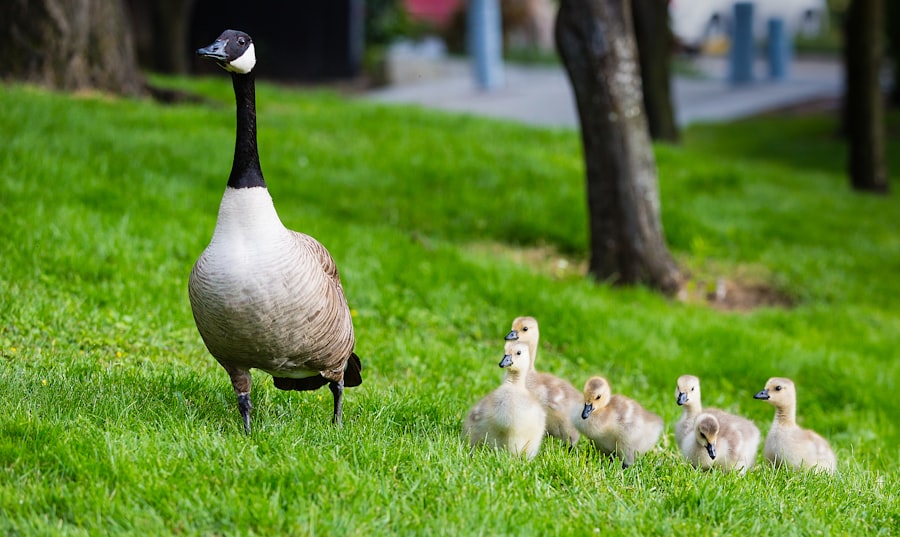
When keeping hens and geese together, it is important to identify potential hazards and risks in the environment. This includes securing the coop and run to prevent predators from gaining access to the birds. Use sturdy fencing and hardware cloth to reinforce the perimeter of the enclosure. Make sure there are no gaps or holes that predators can squeeze through.
It is also important to provide shelter from extreme weather conditions. Hens and geese both need protection from rain, wind, and excessive heat or cold. Ensure that the coop is well-insulated and ventilated to provide a comfortable living environment for both species.
Managing egg production in a mixed flock of hens and geese
Hens and geese have different egg-laying habits and patterns. Hens typically lay eggs in nesting boxes or designated areas within the coop, while geese prefer to lay their eggs in hidden or secluded spots in the outdoor area.
To manage egg production in a mixed flock, it is important to provide suitable nesting areas for both species. This can be done by providing separate nesting boxes for hens and creating secluded areas in the outdoor run for geese. Regularly check these areas for eggs and collect them promptly to prevent them from being damaged or eaten by other birds.
Addressing potential health issues in a mixed flock of hens and geese
Both hens and geese are susceptible to certain health issues, so it is important to take preventative measures to keep them healthy. This includes providing a clean and sanitary living environment, regular health checks, and vaccinations if necessary.
Common health concerns for hens include respiratory infections, parasites, and egg-related issues such as egg binding or prolapse. Geese are prone to respiratory infections, bumblefoot, and angel wing. Regularly monitor the flock for any signs of illness or injury and consult a veterinarian if necessary.
Training hens and geese to coexist peacefully
Introducing new birds to an existing flock can sometimes be challenging, especially when it comes to territorial behavior and aggression. To train hens and geese to coexist peacefully, it is important to introduce new birds gradually and in a controlled manner.
Start by keeping the new birds in a separate enclosure within sight of the existing flock. This allows them to become familiar with each other without direct contact. After a few days, gradually introduce the new birds into the existing flock, monitoring their behavior closely. If any aggression or territorial behavior occurs, separate the birds and try again at a later time.
Conclusion and tips for successfully keeping hens and geese together
In conclusion, keeping hens and geese together can be a rewarding experience that offers numerous benefits. By choosing compatible breeds, providing adequate space, meeting their dietary needs, creating a safe environment, managing egg production, addressing potential health issues, and training them to coexist peacefully, you can successfully keep hens and geese together on your farm or homestead.
Remember to always monitor the flock closely for any signs of aggression or illness and take appropriate action if necessary. With proper care and attention, your mixed flock of hens and geese can thrive and provide you with years of enjoyment.
If you’re interested in keeping hens and geese together, you might find this article on Poultry Wizard quite helpful. It provides valuable insights on the topic and offers practical advice on how to successfully house these two species together. Check it out here for more information.
FAQs
What are the benefits of keeping hens and geese together?
Keeping hens and geese together can provide several benefits, such as increased security against predators, improved soil fertility, and reduced pest populations.
What are the potential drawbacks of keeping hens and geese together?
One potential drawback of keeping hens and geese together is that geese can be aggressive towards smaller animals, including chickens. Additionally, geese can produce more waste than chickens, which can lead to sanitation issues if not managed properly.
What should I consider before keeping hens and geese together?
Before keeping hens and geese together, it is important to consider the size of your property, the number of birds you plan to keep, and the availability of resources such as food, water, and shelter. You should also research the specific breeds of hens and geese you plan to keep to ensure they are compatible.
How can I ensure the safety of my hens and geese?
To ensure the safety of your hens and geese, it is important to provide adequate shelter and fencing to protect them from predators. You should also supervise their interactions and separate any birds that show signs of aggression towards each other.
What should I feed my hens and geese?
Hens and geese have different dietary needs, so it is important to provide them with separate feeders and appropriate feed. Hens require a diet high in protein, while geese require a diet high in fiber. Both should have access to fresh water at all times.
How can I manage waste and sanitation when keeping hens and geese together?
To manage waste and sanitation when keeping hens and geese together, it is important to regularly clean their living area and provide adequate space for them to move around. You can also use their waste as fertilizer for your garden or compost pile.
Meet Walter, the feathered-friend fanatic of Florida! Nestled in the sunshine state, Walter struts through life with his feathered companions, clucking his way to happiness. With a coop that’s fancier than a five-star hotel, he’s the Don Juan of the chicken world. When he’s not teaching his hens to do the cha-cha, you’ll find him in a heated debate with his prized rooster, Sir Clucks-a-Lot. Walter’s poultry passion is no yolk; he’s the sunny-side-up guy you never knew you needed in your flock of friends!

